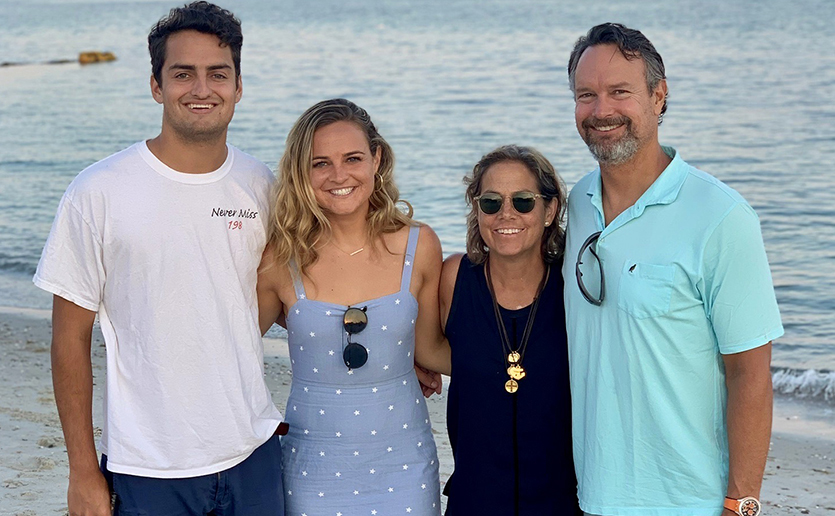For 15 years, Steven Isakoff, MD, PhD, an oncologist at Massachusetts General Hospital, observed a growing trend: some of his patients were developing a type of breast cancer that failed to respond — and in some cases rapidly advanced — under standard treatment.
Dr. Isakoff’s triple negative breast cancer patients are often under 50 and have young children.
Distressingly, the women tended to be under 50 and often had young children. The diagnosis weighed heavily on these patients, Dr. Isakoff recalls — and he wanted to help them.
The cancer, which would come to be identified as triple negative breast cancer, lacked three common cellular receptors known to drive breast cancer growth: estrogen, progesterone and HER2. Because most standard treatments target these receptors, they are ineffective at stopping tumor growth in triple negative breast cancer.

Triple negative breast cancer accounts for about 15% of all breast cancers, or more than 40,000 cases yearly in the United States, explains Dr. Isakoff, associate director of clinical research for the Mass General Cancer Center and director of breast cancer clinical research.
In addition to affecting younger women, this aggressive and devastating disease is more likely to affect Black women and patients from underserved populations. Researchers do not know why these groups are more affected, but are looking for answers.
Women with common breast cancers can have survival rates of five years after a diagnosis of advanced disease, while many live much longer. By comparison, metastatic triple negative breast cancer patients’ survival rates are one year to 18 months after diagnosis, Dr. Isakoff says.
An Anniversary Gift and Foundation Support
In 2018, with start-up funds from Shannon and Drew Hayden, Dr. Isakoff established Mass General’s Triple Negative Breast Cancer Program. Shannon, who lives in Newton, Massachusetts, was diagnosed with triple negative breast cancer at 52. Through her post-chemo treatment complications Dr. Isakoff was there for her, providing steady guidance, Shannon says. On her one-year anniversary of chemotherapy, Shannon and her husband, Drew, made the donation to help other triple negative patients.
With the Hayden family’s funding, Dr. Isakoff was able to hire a research coordinator and created a tissue bank of 500 patients — hoping to find clues to further understand the disease. Dr. Isakoff also initiated studies, including an innovative vaccine trial for triple negative patients. “We believe in the work Dr. Isakoff is doing,” says Shannon, her voice filled with emotion. “We want the science to keep developing so there is a drug or treatment for triple negative patients that will lessen the worry of the cancer returning.”
Drs. Ho and Isakoff are jointly leading three trials investigating novel therapies for patients.

Another significant supporter of triple negative breast cancer research, the Breast Cancer Research Foundation, is funding radiation oncologist Alice Ho, MD, MBA, to study the combination of radiation with immunotherapy, which employs the body’s immune system to bind and kill cancer cells.
Drs. Ho and Isakoff are jointly leading three trials combining radiation with novel targeted therapies for triple negative breast cancer patients. These Mass General-led clinical trials are the first of their kind in the United States, and they are available to patients at other major academic medical centers across the country.
A Partnership of Care
In 2020, Mass General joined with Boston Medical Center (BMC) and Dana-Farber Cancer Institute to offer shared clinical trials for cancer patients. Then, in 2021, Mass General and BMC began the two hospitals’ first-ever shared clinical trial for triple negative breast cancer. Through this partnership, BMC patients will receive their care at BMC and have access to a treatment developed at Mass General, says Beverly Moy, MD, MPH, clinical director of the Breast Oncology Program at Mass General.

“Boston Medical Center serves a huge proportion of underserved cancer patients and they do an incredible job,” Dr. Moy says. “Mass General formed the partnership to provide the best possible access to clinical trials to BMC patients as an important part of Mass General’s commitment to providing the best possible cancer care to all communities that we serve.”
Research Brings Hope and Optimism
As researchers learn more about triple negative breast cancer, they are investigating and discovering more effective treatments.
Aditya Bardia, MD, MPH, director of breast cancer research, led the initial clinical development and subsequent pivotal trials of the targeted antibody drug sacituzumab govitecan, resulting in accelerated approval by the Food and Drug Administration in April 2020.
Dr. Bardia’s study found sacituzumab govitecan significantly shrank tumors in 35% of patients with metastatic triple negative breast cancer — compared to only 5% who had standard chemotherapy. His goal is for research to further increase the response rate to 50% or even higher and improve survival times.
“Clinical trials provide hope and optimism for patients.”

Additional clinical trials seeking to improve this response are being explored through the Mass General–BMC partnership.
“Clinical trials provide hope and optimism for patients,” Dr. Bardia says. “Many times, a clinical trial can give patients access to a therapy that’s potentially better than the current standard of care.”
To make a donation to support Mass General’s Triple Negative Breast Cancer Program, please contact us.


